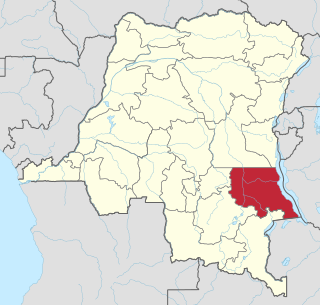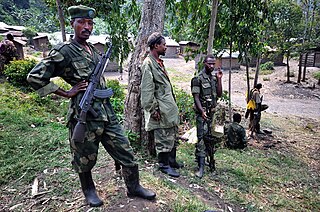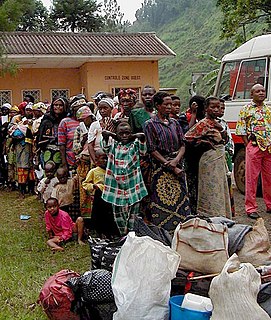The region that is now the Democratic Republic of the Congo was first settled about 80,000 years ago. The Kingdom of Congo remained present in the region between the 14th and the early 19th centuries. Belgian colonization began when King Leopold II founded the Congo Free State, a corporate state run solely by King Leopold. Reports of widespread murder and torture in the rubber plantations led the Belgian government to seize the Congo from Leopold II and establish the Belgian Congo. Under Belgian rule numerous Christian organizations attempted to Westernize the Congolese people.

North Kivu is a province bordering Lake Kivu in the eastern Democratic Republic of the Congo. Its capital is Goma.

Goma is the capital of North Kivu province in the eastern Democratic Republic of the Congo. It is located on the northern shore of Lake Kivu, next to the Rwandan city of Gisenyi. The lake and the two cities are in the Albertine Rift, the western branch of the East African Rift system. Goma lies only 13–18 km (8.1–11.2 mi) south of the active Nyiragongo Volcano. The recent history of Goma has been dominated by the volcano and the Rwandan Genocide of 1994, which in turn fuelled the First and Second Congo Wars. The aftermath of these events was still having effects on the city and its surroundings in 2010. The city was captured by rebels of the March 23 Movement during the M23 rebellion in late 2012, but has since been retaken by government forces.
The Transitional Government of the Democratic Republic of Congo was tasked with moving from the state riven by the Second Congo War (1998-2003) to a government based upon a constitution agreed on by consensus. In 2001 President Laurent Kabila was assassinated and his son Joseph Kabila was named head of state.

Tanganyika is one of the 26 provinces of the Democratic Republic of the Congo. Specified under Article 2 of the country's 2006 Constitution, Tanganyika was finally created in 2015 from the eponymous Tanganyika District, previously part of the pre-2015 Katanga Province. Its capital is Kalemie.
Antipas Mbusa Nyamwisi is a politician and former rebel leader in the Democratic Republic of the Congo. He leads the Forces for Renewal political party and was Minister of Decentralization and Urban and Regional Planning until September 2011 when he resigned to run for president. He was previously the Minister of Foreign Affairs from 2007 to 2008.
Congolese history in the 2000s has primarily revolved around the Second Congo War (1998–2003) and the empowerment of a transitional government.
Laurent Nkunda is a former General in the Armed Forces of the Democratic Republic of Congo (DRC) and is the former warlord operating in the province of Nord-Kivu, sympathetic to Congolese Tutsis and the Tutsi-dominated government of neighbouring Rwanda. Nkunda, who is himself a Congolese Tutsi, commanded the former DRC troops of the 81st and 83rd Brigades of the DRC Army. He speaks English, French, Swahili, Kinyarwanda, Lingala and Kinande. On January 22, 2009, he was put under house arrest in Gisenyi when he was called for a meeting to plan a joint operation between the Congolese and Rwandan militaries.

Kanyabayonga is a town in Lubero Territory, North Kivu province, Democratic Republic of the Congo. The town has suffered from continued violence between the army and rival militias since 1993.

Pweto is a town in the Haut-Katanga Province of the Democratic Republic of the Congo (DRC). It is the administrative center of Pweto Territory. The town was the scene of a decisive battle in December 2000 during the Second Congo War which resulted in both sides making more active efforts to achieve peace. Pweto and the surrounding region were devastated during the war. As of 2011 little had been done to restore infrastructure or rebuild the economy. The town is served by Pweto Airport.

The M23 rebellion was fighting in North Kivu, Democratic Republic of the Congo (DRC), that occurred between the March 23 Movement and government forces. The rebellion was part of continued fighting in the region after the formal end of the Second Congo War in 2003. It broke out in 2012 and continued into 2013, when a peace agreement was made among eleven African nations, and the M23 troops surrendered in Uganda.

The March 23 Movement, often abbreviated as M23 and also known as the Congolese Revolutionary Army, was a rebel military group based in eastern areas of the Democratic Republic of the Congo (DRC), mainly operating in the province of North Kivu. The 2012 M23 rebellion against the DRC government led to the displacement of large numbers of people. On 20 November 2012, M23 took control of Goma, a provincial capital with a population of one million people, but was requested to evacuate it by the International Conference on the Great Lakes Region because the DRC government had finally agreed to negotiate with them. In late 2013 Congolese troops, along with UN troops, retook control of Goma and M23 announced a ceasefire, saying it wanted to resume peace talks.

The Minister of Defence, Disarmament, and Veterans (MDNDAC) is a minister of the DR Congo government responsible for implementation of government defence policy and supervises the Armed Forces of the Democratic Republic of the Congo. Since 2015, the position has been held by Crispin Atama Tabe.
The following lists events that happened during 1998 in the Democratic Republic of the Congo.









